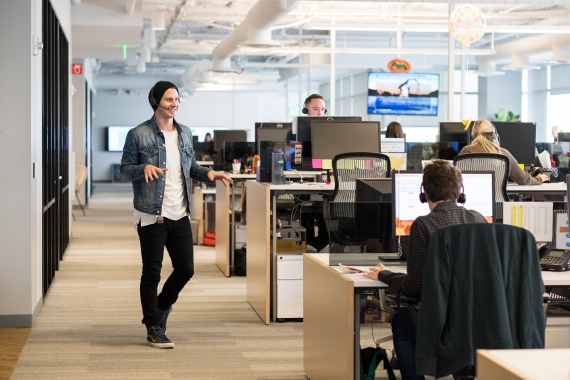
On the surface, the announcement that Ireland’s economy is the fastest-growing in the EU for the fifth year in a row would appear also to be good news for the country’s startup scene. GDP increased by 6.7% in 2018 (although it should be noted that this figure is somewhat distorted by the presence of the number of leading multi-nationals being headquartered here), accompanied by a 3.3% expansion in domestic demand, and a decrease in the national debt in relation to GDP to around 68%.
These healthy figures would also at first glance appear to have had a positive impact on the country’s startup ecosystem.
According to a TechIreland Funding Review, €930 million was invested in 223 startup companies from across the country in 2018, which included equity funding, grants and debt. However, these seemingly positive numbers may not reveal the whole story. For instance, 60% of the €930 million was invested in only 9 enterprises, so while the headline figure looks very healthy, it may be disguising the fact that the number of start-ups who are able to obtain investment is not growing. Although the money raised by start-ups in 2017 was significantly lower at €620 million, the spread was wider, with 242 (+19) companies garnering either initial or secondary investment.
Some other interesting data to come out of the funding review was the breakdown of the sectors to which the funding was directed. Health was some way out in front, with €361 million (this does not include €350 million which went to Genomic Medicine Ireland), followed by Greentech (€165 million), enterprise solutions (€157 million) and fintech (€139 million).
If the overall health of a startup ecosystem can in part be measured by the number and size of exits, then this is perhaps also some cause for concern. The acquisition of Movidius by Intel for €322 million in March 2018 certainly stands out, but otherwise the frequency with which these have been occurring is not regarded as being sufficient to impact the entire system here.
It has also become somewhat axiomatic that Ireland’s startup ecosystem is facing issues regarding the provision of early stage and seed funding, even though 2018 ended and 2019 began with some good news stories in this regard. In December last year, Dublin-based AI software firm Artomatix gained €3.2 million in funding from two separate sources, while earlier this year Galway-based MedTech firm EnteraSense secured €3.5 million in a seed round and through a European Union Horizon 2020 grant.
The infrastructure of the Ireland startup scene
In many ways, Ireland already has much of the infrastructure in place to foster a sustainable startup culture. The government provides significant support in the tech sector, we have the lowest corporate tax rates in Europe at 12.5%, and as such have received a good deal of FDI, while tech companies can receive a 25% tax credit for R&D.
There is also no shortage of state-run funds, incentives and tax benefits available to start-ups, such as the OPTIMISE eCommerce fund (designed to grow online businesses), the Employment Incentive and Investment Scheme (which gives individual investors tax relief on their investments), the Seed Capital Scheme (providing tax refunds for people starting the own business), and the Halo Business Angel Network (HBAN), which facilitates syndicated angel investments.
Further government support is also available through organisations like Enterprise Ireland, StartUp Ireland, ConnectIreland, Startup Dublin and Startups.ie, as well as independent agencies like TechIreland. Higher education institutions are also a vital part of the ecosystem, with NovaUCD, Launch Box at TCD, and DCU Ryan Academy, amongst others, providing mentoring, workspaces, and access to research and funding.
Ireland is also home to a good number of accelerators and incubators, including pre-seed and seed funding startup specialists like NDRC, as well as post-Series A venture capital funds like: Atlantic Bridge, Kernel Capital Venture Funds, and ACT Venture Capital Fund (specialising in tech funding); Fountain Healthcare Partners Fund and Seroba Life Sciences (medical and life sciences funding); and Frontline Venture Fund and Suir Valley Ventures (investing in B2B tech and software solutions).
Centered largely around the Digital Docklands in Dublin, there are also several innovative startup hubs and co-working spaces, where both workspace facilities, mentoring and access to investment are available, like Dogpatch Labs, CoCreate, DoSpace, Space@Dublin BIC, CoWork@GEC and Fumbally Exchange (FEX).
Where to Next for Ireland Startups?
Despite its many advantages, there are nevertheless some significant challenges facing the Irish startup ecosystem as we move further into 2019, and it can be argued that these are primarily the result of a lack of government agility and adaptability to the current needs of startups, and the seemingly never-ending problem of bureaucratic red tape.
It is undoubtedly the case that difficulties around early stage and seed funding are still an inhibitor to growth, as demonstrated by the fact that there were fewer companies attracting funding in 2018 when compared to 2017, despite the significant increase in the total amount raised.
Whether the presence of so many tech multi-nationals in the country perhaps blinds investors to the extent of local innovation and expertise is certainly up for debate, but there is no question that despite the amount of FDI and the number of VCs looking to get into the startup space, the funding going to those Irish startups in the embryonic phase would seem to be on the decline.
Industry observers have also argued that there is something of a seed capital crisis in part because the emphasis on providing a tax-friendly environment for multi-nationals has been accompanied by a failure of the government to put in place tax relief systems that incentivize local investment, such as currently exist in other competitor countries.
The Seed Enterprise Investment Scheme (SEIS) and Enterprise Investment Scheme (EIS) in the UK are often cited as positive examples as to how this can be done, while it is the case that Ireland’s similar Business Expansion Scheme - Employment Incentive and Investment Scheme (BES-EIIS) does not go far enough in providing incentives to investors.
Capital Gains Tax as it relates to employee share ownership rules, which sees shareholders in a startup slugged with a significant tax bill if they are acquired, is thought to further inhibit potential pre-seed and seed funding for startups.
Following on from this, the lack of successful startup founders whose enterprises have benefited from exit and acquisition, and who should now find themselves in a position either to act as mentors for other up-and-coming entrepreneurs, or to become startup investors themselves, is also impacting on the ability of startups to grow, as there is a lack of practical advice and guidance from those who have travelled down this road themselves.
Case Study: Ireland v Tel Aviv v Berlin
Israel probably has one of the most developed startup ecosystems on the planet, with Tel Aviv leading the way. Berlin is some way behind in its development, and is probably closer to Ireland, but a comparison of the three suggests some potential future directions for Ireland, and what might be achieved given the right sort of regulatory and investment environment.
It is certainly the case that is possible to raise larger sums of investment capital more quickly in Tel Aviv than in either Ireland or Berlin. For example, Papaya Global, which has created a system to automate global payroll, raised $4.5 million dollars in its seed round, far more than the typical seed fund raised by Dublin or Berlin startups.
However, at the same time salaries are on average higher in Tel Aviv, because the exceptional pool of talent in Israel — and the competition for it — means that the best can command far more than they would in either Ireland or Berlin (although still nowhere near as much as in the US). This can naturally be a drain on the viability and sustainability of startups.
The fact that Tel Aviv’s ecosystem is considerably more developed than in the other two locations also means that there are more funds who are prepared to support local talent, given the previous success rate of others. There is a clear role model for potential investors to follow, and they can see the value and tangible benefits of investing locally.
One area in which both Berlin and Ireland, however, do perhaps have an advantage over Tel Aviv is the presence of a significant number of large tech corporations, which can provide opportunities for B2B startups to make connections and collaborate. It can therefore be argued there are more ways in which startups and their founders can garner experience and expertise from working with these successful multi-nationals than is the case in Israel.
Finally, Berlin probably leads the way in successful B2C startups, as the bigger internal market in Germany has naturally led to more user-focused development. With their significantly smaller populations, both Israel and Ireland startups have tended to look outwards to the global market and a focus on business solutions, rather than developments designed for everyday users or consumers.

















